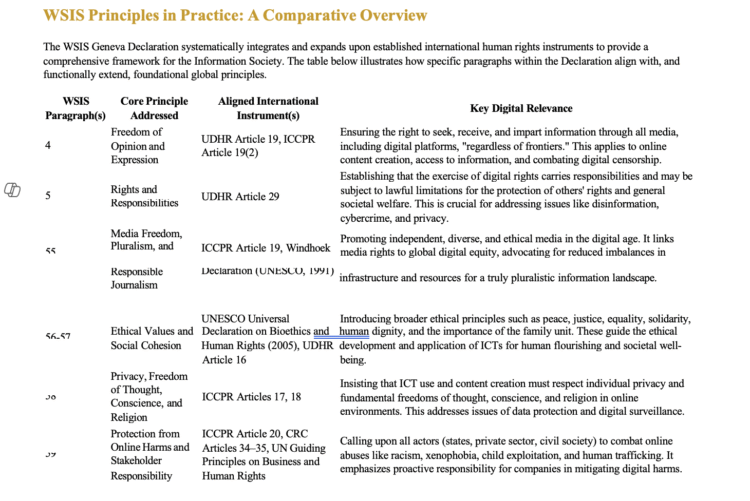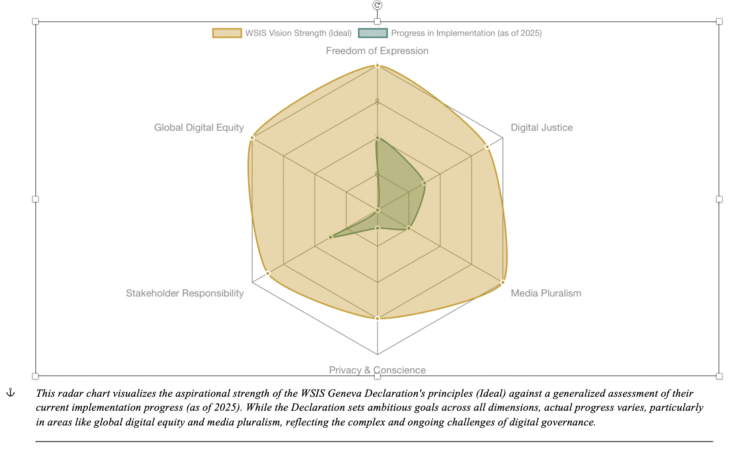Navigating the Digital Frontier: How the WSIS Geneva Declaration Shaped Rights, Ethics, and Responsibilities
WSIS plus 20 Ethics Human Rights Freedom of Information
The World Summit on the Information Society (WSIS) Geneva Declaration of Principles, adopted in 2003, represents a landmark effort to define a future-oriented vision for a “people-centered, inclusive and development-oriented Information Society.” This seminal document meticulously integrated and extended existing international human rights and ethical standards into the burgeoning digital realm.
By focusing on specific paragraphs —notably 4, 5, 55, and 56–59— the Declaration demonstrates a profound commitment to embedding universal values within the fabric of our interconnected world. It serves as a vital normative framework, drawing direct parallels with foundational instruments such as the Universal Declaration of Human Rights (UDHR), the International Covenant on Civil and Political Rights (ICCPR), and other influential soft-law guidelines from entities like UNESCO and the UN Human Rights Council. The Declaration’s foresight in addressing the complexities of digital governance ensured its continued relevance in the dynamic information landscape.
Reaffirming Fundamental Rights in the Digital Era
The WSIS Geneva Declaration unequivocally reaffirmed the bedrock principles of human rights, adapting them for the digital environment. Central to this reaffirmation are paragraphs 4 and 5, which underscore the paramount importance of freedom of expression and the inherent balance between individual rights and collectiveresponsibilities.
Freedom of Expression Without Frontiers
Paragraph 4 of the Declaration directly echoes Article 19 of the Universal Declaration of Human Rights and Article 19(2) of the International Covenant on Civil and Political Rights. It asserts that “everyone has the right to freedom of opinion and expression; this right includes freedom to seek, receive and impart information and ideas through any media and regardless of frontiers.”
This provision is not merely a restatement; it extends these vital civil and political rights explicitly into the realm of information and communication technologies (ICTs). In practice, this means that the principles of free speech and access to information apply equally online as they do offline. The Declaration thus calls for the proactive addressing of barriers such as digital censorship and the digital divide, ensuring that ICTs genuinely facilitate open communication and the free flow of ideas.
The Balance of Rights and Responsibilities
Complementing freedom of expression, Paragraph 5 of the Declaration reflects Article 29 of the UDHR by emphasizing that the exercise of rights is intrinsically linked to responsibilities. It stipulates that these rights may be subject to lawful limitations necessary to ensure respect for the rights and freedoms of others and to promote the general welfare in a democratic society.
This nuanced approach is particularly critical in the digital age, where the rapid dissemination of information can give rise to challenges like disinformation, hate speech, and cybercrime. By highlighting this balance, the WSIS Declaration provides a framework for responsible digital citizenship, ensuring that expanded digital freedoms do not undermine social cohesion or public order.
The ongoing WSIS+20 review process continues to assess how these principles have influenced international cooperation on digital rights, with ongoing debates on issues like platform content moderation and online safety.
Cultivating an Ethical Digital Landscape: Justice and Solidarity
Beyond legal compliance, the WSIS Geneva Declaration articulates a far-reaching ethical vision for the Information Society. Paragraphs 56 and 57 introduced a set of core values intended to guide the development and use of ICTs, fostering a human-centered digital environment.
Core Values for a Human-Centric Information Society
These paragraphs champion principles such as peace, justice, equality, solidarity, tolerance, respect for cultural diversity, and the dignity of the human person. These values resonate deeply with international instruments like UNESCO’s Universal Declaration on Bioethics and Human Rights (2005), which advocates for universal respect for human dignity and shared global values in the advancement of science and technology. This ethical framework extends beyond mere technical functionality, urging that technological progress must serve humanity’s best interests and uphold fundamental human values. For instance, in the context of emerging technologies like Artificial Intelligence (AI), these principles call for “ethics by design,” ensuring that AI systems are developed and deployed in a manner that respects human rights and promotes societal well-being.
The Cornerstone of Social Cohesion: The Family Unit
Paragraph 57 further emphasizes the importance of the family unit as a cornerstone of social cohesion, aligning with Article 16 of the UDHR. This highlights the Declaration’s holistic approach, recognizing that a just digital society must also reinforce traditional social structures and intergenerational solidarity.
This ethical stance extends to the concept of “digital justice,” which seeks to address existing inequalities in access and participation. Initiatives aligned with the UN’s Sustainable Development Goals (SDGs), particularly Goal 9 (Industry, Innovation, and Infrastructure) and Goal 16 (Peace, Justice, and Strong Institutions), are direct manifestations of WSIS’s call for inclusive policies that bridge digital divides related to gender, geography, and socio-economic status. Furthermore, the ethical vision of WSIS encourages businesses, especially tech firms, to adhere to principles like the UN Guiding Principles on Business and Human Rights, promoting proactive measures to prevent digital harms and ensure equitable access to technology.
The Pillars of Openness: Media Freedom and Equitable Access
The WSIS Geneva Declaration places significant emphasis on the role of media and the imperative of equitable access to information and communication technologies, recognizing them as fundamental to democratic societies and inclusive development.
Promoting Pluralistic and Responsible Journalism
Paragraph 55 of the Declaration champions media freedom, pluralism, and responsible journalism. These principles are deeply rooted in Article 19 of the ICCPR andresonate with the spirit of the Windhoek Declaration on Promoting an Independent and Pluralistic African Press (UNESCO, 1991), which has been endorsed by the UN General Assembly. The WSIS Declaration positions media as a critical pillar of democratic societies, advocating for independent and diverse outlets to ensure a rich tapestry of voices and perspectives. In the contemporary digital landscape, this translates to addressing challenges such as platform governance, algorithmic biases, and the safety of journalists in online spaces. These issues are actively discussed in international forums, including the ongoing WSIS+20 review process, which seeks to adapt these principles to emerging threats and opportunities.
Bridging the Global Digital Divide for Equity
Crucially, WSIS ties media rights directly to the broader objective of global digital equity. It explicitly calls for concerted action to reduce “international imbalances” in critical areas such as ICT infrastructure, digital skills, and technical resources. This linkage underscores that access to information is not merely a technical issue but a fundamental human right that underpins transparent governance, social inclusion, and economic opportunity.
The digital divide, which continues to affect billions globally, exacerbates existing inequalities and undermines rights related to education, participation, and economic advancement. Therefore, the Declaration’s call for global infrastructure development and capacity building remains an urgent and ongoing priority. This principle is directly supportive of the Sustainable Development Goals, particularly SDG 9, which focuses on resilient infrastructure and inclusive innovation, and SDG 16, emphasizing access to information and the creation of inclusive societies.
Safeguarding Individuals: Protection from Digital Harms
The WSIS Geneva Declaration demonstrates a keen awareness of the potential negative ramifications of digital transformation. It directly addresses the imperative of protecting individuals from various forms of harm that can arise within the digital sphere.
Upholding Privacy and Freedom of Thought
Paragraph 58 of the Declaration specifically mandates that the use of ICTs and the creation of digital content must rigorously respect personal privacy, freedom ofthought, conscience, and religion. This insistence is fully consistent with Article 17 (privacy) and Article 18 (freedom of thought, conscience, and religion) of the International Covenant on Civil and Political Rights. This provision underscores the critical importance of safeguarding individual liberties in online environments,emphasizing that technological advancement should not come at the expense of fundamental human rights. Debates surrounding data privacy, surveillance, and algorithmic transparency continue to highlight the ongoing relevance of this principle in 2025, calling for robust legal and ethical frameworks to protect individuals’ digital autonomy.
Combating Online Abuses and Fostering Responsibility
Furthermore, paragraph 59 of the Declaration issues a strong call to action, urging all stakeholders—including states, the private sector, and civil society—to actively combat abuses such as racism, xenophobia, child exploitation, and human trafficking. The Declaration recognizes that these abhorrent crimes increasingly manifest and proliferate online, necessitating a concerted global response. These provisions align seamlessly with Article 20 of the ICCPR, which prohibits incitement to discrimination or violence, and Articles 34–35 of the Convention on the Rights of the Child (CRC), which protect children from exploitation.
Moreover, the call for proactive responsibility among companies, particularly tech firms, is in direct harmony with the UN Guiding Principles on Business and Human Rights, which outline the obligations of businesses to respect human rights throughout their operations. The WSIS framework thus provides a robust ethical and legal foundation for addressing the “darker side” of digital transformation, ensuring that the benefits of connectivity are not overshadowed by emerging threats to human dignity and safety.
WSIS Principles in Practice: A Comparative Overview
The WSIS Geneva Declaration systematically integrates and expands upon established international human rights instruments to provide a comprehensive framework for the Information Society. The table below illustrates how specific paragraphs within the Declaration align with, and functionally extend, foundational global principles.

Calling upon all actors (states, private sector, civil society) to combat online abuses like racism, xenophobia, child exploitation, and human trafficking. It emphasizes proactive responsibility for companies in mitigating digital harms.
Assessing the Vision: A Radar Chart of WSIS Principles
To further understand the comprehensive nature of the WSIS Geneva Declaration, we can visualize the strength of its vision across various dimensions of digital rights and ethics, along with an assessment of the progress in their implementation as of 2025. This radar chart provides a comparative perspective, highlighting both the aspirational goals set by the Declaration and the ongoing challenges in realizing them in a rapidly evolving digital world.

Conclusion
The WSIS Geneva Declaration of Principles stands as a pivotal document, serving as a normative bridge between traditional international human rights law and therapidly evolving ethical landscape of the digital age. While firmly rooted in foundational texts such as the Universal Declaration of Human Rights, the International Covenant on Civil and Political Rights, and the Convention on the Rights of the Child, it transcends mere legal compliance.
The Declaration articulates a broader moral and participatory vision, integrating ethics, stakeholder responsibility, and the imperative of global equity into the discourse on digital human rights. Its foresight in addressing issues ranging from freedom of expression and privacy to media pluralism and the combatting of online harms ensures its enduring relevance.
As the global community continues to grapple with the complexities and opportunities presented by rapid technological advancement, the Geneva Declaration remains an indispensable and aspirational guidepost for shaping inclusive, just, and responsible information societies worldwide. Its principles continue to inform ongoing international dialogues, such as the WSIS+20 review process, which assesses progress and adapts strategies to address contemporary challenges like AI governance and cybersecurity, ensuring that the Information Society truly serves humanity’s needs.
Referenced Search Results
World Summit on the Information Society (WSIS) Geneva Declaration of Principles (2003) -ITU
World Summit on the Information Society (WSIS) Plan of Action (2003) – ITU
Digital rights – Wikipedia
The Implications for Human Rights in the Digital Age – RAND Corporation
The Right to Information and Privacy: Balancing Rights and… – ResearchGate
Everything you need to know about the WSIS+20 Review (updated) – GP-Digital
Information Society must uphold human dignity, recognize human rights as guiding principles, acting rights chief tells Geneva Summit
This text was prepared by Daniel Stauffacher with the help of ChatGPT and Ithy.
